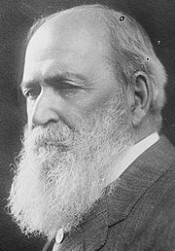Basil Lanneau Gildersleeve (October 23, 1831 – January 9, 1924), American classical scholar, was born in Charleston, South Carolina, son of Benjamin Gildersleeve (1791–1875), a Presbyterian evangelist, and editor of the Charleston Christian Observer from 1826 to 1845, of the Richmond (VA) Watchman and Observer from 1845 to 1856, and of The Central Presbyterian from 1856 to 1860. B.L. Gildersleeve graduated from Princeton in 1849 at the age of eighteen, and went on to study under Johannes Franz in Berlin, under Friedrich Ritschl at Bonn and under Schneidewin at Göttingen, where he received his doctor's degree in 1853. From 1856 to 1876 he was professor of Greek at the University of Virginia, holding the chair of Latin also from 1861 to 1866. After service for the Confederate States Army in the American Civil War, during which Gildersleeve was shot in the leg, he returned to the University of Virginia.[1] Ten years later, he accepted an offer from Daniel Coit Gilman of a position at The Johns Hopkins University. In 1880, the American Journal of Philology, a quarterly published by the Johns Hopkins University, was established under his editorial charge, and his strong personality was expressed in the department of the Journal headed "Brief Report" or "Lanx Satura," and in the earliest years of its publication every tiny detail was in his hands. His style in it, as elsewhere, is in striking contrast to that of the typical classical scholar, and accords with his conviction that the true aim of scholarship is "that which is." He published a Latin Grammar (1867; revised with the co-operation of Gonzalez B. Lodge, 1894 and 1899) and a Latin Series for use in secondary schools (1875), both marked by lucidity of order and mastery of grammatical theory and methods. His edition of Persius (1875) is of great value. But his bent was rather toward Greek than Latin. His special interest in Christian Greek was partly the cause of his editing in 1877 The Apologies of Justin Martyr, "which" (to use his own words) "I used unblushingly as a repository for my syntactical formulae." Gildersleeve's studies under Franz had no doubt quickened his interest in Greek syntax, and his logic, untrammeled by previous categories, and his marvelous sympathy with the language were displayed in this most unlikely of places. His Syntax of Classic Greek (Part I, 1900, with CWE Miller) collects these formulae. Gildersleeve edited in 1885 The Olympian and Pythian Odes of Pindar, with a brilliant and valuable introduction. His views on the function of grammar were summarized in a paper on The Spiritual Rights of Minute Research delivered at Bryn Mawr on June 16, 1895. His collected contributions to literary periodicals appeared in 1890 under the title Essays and Studies Educational and Literary. He was elected president of the American Philological Association in 1877 and again in 1908 and became a member of the American Academy of Arts and Letters as well as of various learned societies. He received the degree of LL.D. from William and Mary (1869), Harvard (1896), Yale (1901), Chicago (1901), and Pennsylvania (1911); D.C.L. from the University of the South (1884); L.H.D. from Yale (1891) and Princeton (1899); Litt.D. from Oxford and Cambridge (1905). Gildersleeve retired from teaching in 1915. Gildersleeve House, one of the undergraduate dormitories at Johns Hopkins, is named in his honor. This article incorporates text from an edition of the New International Encyclopedia that is in the public domain.



